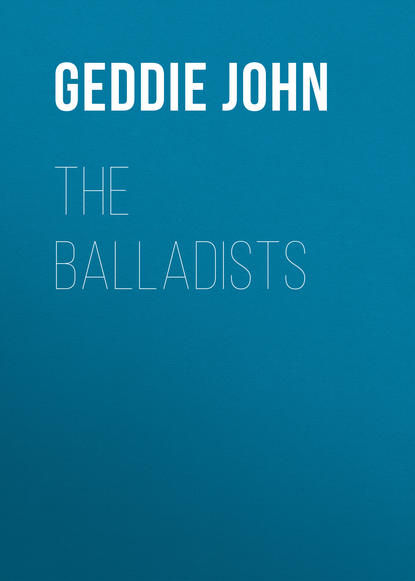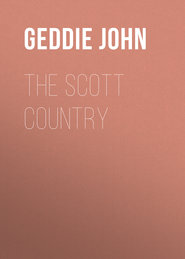По всем вопросам обращайтесь на: info@litportal.ru
(©) 2003-2024.
✖
The Balladists
Настройки чтения
Размер шрифта
Высота строк
Поля
a farewell that reminds us of that of the Highland cateran, Macpherson, who 'so rantingly, so dantonly,' played a spring and danced to it beneath the gallows-tree at Banff, crying out the while against 'treacherie,' and broke his fiddle across his knee when none among the crowd would take it from his hand.
Like Sir Lancelot, in the famous eulogy of Sir Ector, these Borderers of old were not only strong men of their hands, but strong also of heart, and 'true friends to their friends,' who, since they held the first line of defence of the Kingdom, might be said to embrace, after their own family and clan, their countrymen at large. They might, on occasion, 'seek their broth in England and in Scotland both.' But they robbed and slew, when it was possible, with patriotic discrimination. In Johnie Armstrong and The Sang o' the Outlaw Murray the heroes take credit for their 'honesty' and for their services to their country. The former boasts that 'never a Scots wife could have said that e'er I skaithed her ae puir flee'; and the other that he had won Ettrick Forest from the Southron without help from king or noble. Yet the quarrel of both is with the Scottish sovereign, who has come South intent on the exemplary and kingly work of 'making the rash bush keep the cow'; and, stranger still, it is for the bold-spoken outlaws, and not for the legitimate guardian of Border peace, that the minstrel engages our sympathies.
If we may credit the surmises of Mr. P. Macgregor Chalmers, the Outlaw Murray is none other than the 'John Morvo,' the builder who has set an admirable mark of his own upon Melrose Abbey and other ecclesiastical fanes, and, as Sheriff of the Forest, built Newark Castle after he had, in jest or earnest, defied the authority of his patron, King James IV.; perhaps he was even the writer of the ballad. This is a pretty strong order on our faith; although it must be confessed that there is a singular mixture, in this fine old lay, of information on architecture, venerie, and local ownership of land; and the Outlaw is made to have all the best of the combat of wits and words, and of the bargain with which it ends. 'Name your lands,' cries the King, 'where'er they lie, and here I render them to thee'; and the Outlaw promptly responds:
'"Fair Philiphaugh is mine by right,
And Lewinshope still mine shall be,
Newark, Foulshiels, and Tinnis baith,
My bow and arrow purchased me.
And I have native steads to me,
And some by name I do not knaw;
The Hangingshaw and Newark Lee,
And mony mair in the Forest shaw."'
Very different was the guerdon which Johnie Armstrong of Gilnockie got from King James the Fifth, when, in an evil hour, he came with a gallant company from his stronghold in Eskdale to meet that monarch, who had ridden with a strong force into the heart of the moss-troopers' country, intent on taming the marchmen. Well might the ladies 'look from their loft windows,' and sigh, 'God bring our men weel hame again!' as Johnie, and the six-and-thirty Armstrongs and Elliots in his train, ran their horses through Langholm howm in their haste to welcome their 'lawful king.' This expedition of 1529 has left its mark on ballad poetry as well as history; through the hanging of Cockburn of Henderland it gave occasion for the Lament of the Border Widow. But no incident in it made deeper impression on the popular memory – none seems to have caused more sorrow and reprobation – than the stringing up of the Laird of Gilnockie and his followers on the trees at Carlenrig, at the head of Teviot. A 'Johnie Armstrong's Dance' was popular when the Complaynt of Scotland was written twenty years later; and Sir David Lyndsay, in one of his plays, makes his Pardoner hawk about, among his relics of saints, the cords of good hemp that hanged the unlucky laird of Gilnockie Hall, with the commendation that
'Wha'ever beis hangit in this cord
Neidis never to be drowned.'
At the bar of judgment of the balladists, the deed was counted murder:
'Scotland's heart was ne'er sae wae
To see sae mony brave men die';
and murder all the less pardonable, since the king who ordered it was himself an inspirer and, as some say, a writer of ballads. As is pointed out in the Border Minstrelsy, the ballad, in its account of the interview between the king and his troublesome subject, follows pretty closely the narrative of Pitscottie. 'What wants that knave that a king should have?' was the offended remark of James, when he saw the band approaching him in the bravery of their war-gear. And Johnie, when all his appeals and bribes proved to be vain, could also speak a frank word:
'"To seek het water beneath cauld ice,
Surely it is a great follie;
I have asked grace at a graceless face,
But there is nane for my men and me."'
Whatever their misdeeds, Gilnockie and his men had certainly hard measure and short shrift. The king's courtiers, it is alleged, incited him to make a summary end of the Armstrongs; and he had not the biting answer ready which his father is said to have given to the 'keen laird of Buccleuch,' when that Border chieftain urged him to 'braid on with fire and sword' against the Outlaw of Ettrick Forest:
'Now haud thy tongue, Sir Walter Scott,
Nor speak of reif or felonie;
For had every honest man his coo,
A right puir clan thy name would be.'
But when their own clan or dependants made appeal for help or vengeance, none were more prompt with the strong word and deed than the Scotts – witness, Kinmont Willie; witness also, Jamie Telfer o' the Fair Dodhead. When Jamie ran hot-foot to Branksome Hall with the news that the Captain of Bewcastle had ramshackled his house and driven his gear and stock, until
'There was naught left in the Fair Dodhead
But a greeting wife and bairnies three,'
did not Buccleuch start up like an old roused lion?
'"Gar warn the water, braid and wide,
Gar warn it soon and hastilie!
They that winna ride for Telfer's kye,
Let them never look on the face o' me!"'
And the chase goes on, from the Dodhead on the Ettrick until, at the fords of the Liddel, the enemy are brought to bay; and we have the fine picture of Auld Wat of Harden, the husband of the 'Flower of Yarrow,' and a forebear of the author of Waverley, as he 'grat for very rage' when Willie Scott, the son of his chief, lay slain by an English stroke:
'But he 's ta'en aff his good steel cap,
And thrice he 's waved it in the air.
The Dinley's snaw was ne'er mair white
Than the lyart locks of Harden's hair.'
Vain was the offer by the Bewcastle raiders to men in such mood to take back the cattle that had been lifted:
'When they cam' to the Fair Dodhead,
They were a welcome sight to see!
For instead of his ain ten milk-kye,
Jamie Telfer has gotten thirty-and-three.'
Auld Maitland treats of an inroad on the opposite side of the country, of more ancient date and more formidable character. Its hero appears to have been a progenitor of that line of Lethington in East Lothian, and of Thirlstane, in Lauderdale, who, planted firmly on both sides of Lammermuir, produced in after-times warriors, statesmen, and even poets of note. Gavin Douglas places Maitland, with the 'auld beird grey,' among the legendary inmates of his 'Palace of Honour'; and Scott identifies him as a Sir Richard de Mautlant who, in the latter half of the thirteenth century, and probably during the Wars of Independence, held the ancestral lands by Leaderside, on the track of invading armies crossing the Tweed between Coldstream and Melrose, and holding in to Lothian by Soultra Hill. Accordingly, the ballad tells us that the English army, under King Edward, assembled on the Tyne:
'They lighted on the banks of Tweed,
And blew their fires so het,
And fired the Merse and Teviotdale
All in an evening late.
As they flared up o'er Lammermuir
They burned baith up and down,
Until they came to a darksome house,
Some call it Lauder town.'
Many a foray from the same direction followed the same gait, their coming heralded by the bale-fires that flashed the signal from Hume Castle to Edgarhope (wrongly identified by Professor Veitch with Edgerston on Jed Water), and from Edgarhope to Soultra Edge. But memorable above all other Border raids recorded in song or story, is that encounter in which 'the Douglas and the Percy met,' and which has inspired perhaps the very finest of the historical ballads of each country. Moot points there are of locality, date, and circumstances; but it is generally accepted that the rhyme known for many centuries in Scotland as The Battle of Otterburn, and the English Chevy Chase are versions, from opposite sides, of one event – a skirmish fought in the autumn of 1388 on Rede Water, between a band of Scots, under James, Earl of Douglas, returning home laden with spoil, and a body of English, led by Hotspur, the son of the Earl of Northumberland, in which Douglas was slain and young Harry Percy taken prisoner. It were as hard to decide between the merits of these famous old lays as to award the prize for prowess between the respective champions. But it may be noted, as a fine Borderer's trait, that each of the two ballads does full justice to the chivalry and fighting mettle of the enemy. It is to be observed also that they are different poems, and not merely versions of the same; and that The Battle of Otterburn and the other racy and vigorous ballads of its class dealt with in this chapter, are of themselves sufficient to refute the arrogant dictum of Mr. Carew Hazlitt, that Scotland has no original ballad-poetry to speak of, and that what she calls her own are 'chiefly English ballads, sprinkled with Northern provincialisms.'
But while they are, as Scott says, different in essentials, the English and Scottish ballads have exchanged phrases and even verses, as the English and Scottish warriors exchanged strokes, and these of the best:
'When Percy wi' the Douglas met,
I wat they were full fain;
They swakked their swords till sair they swet,
And the blood ran doon like rain,'
may lack some of the picturesqueness of the corresponding passage of Chevy Chase. But nothing, at least in Scottish eyes, can surpass the simple majesty and pathos of the last words of Douglas – words that sound all the sadder since Walter Scott repeated them, when he also had almost fought his last battle and was wounded unto death:
'"My nephew good," the Douglas said,
"What recks the death o' ane?
Last night I dreamed a dreary dream,
And I ken the day 's thy ain.
"My wound is deep, I fain would sleep;
Take thou the vanward o' the three,
And hide me by the bracken bush
That grows upon the lily lee.






